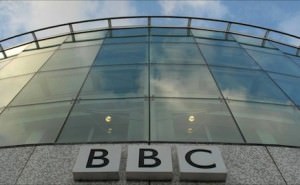BBC Productions Plc?
Posted By Ed Waller On 21-08-2014 @ 10:54 am In Perspective | Comments Disabled
As the Edinburgh International Television Festival kicks off this morning, one of the biggest issues facing delegates will be – as ever – the future of the BBC.

BBC headquarters
The biggest talking points surrounding BBC chief Tony Hall’s plan to get rid of in-house quotas and allow the pubcaster’s production teams to make programmes for non-BBC channels have centred on the impact it would have on content.
Open to commercial pressures for the first time in its 92-year history, the BBC’s programmes and formats would lose their unique public service nature and simply coalesce into all the other commercial content on the market. UK TV would be more homogenous as a result.
It’s an important issue – unfettered by the need to make money, the BBC certainly does take risks the commercial nets are too cautious to try – but it overlooks a much bigger one: Hall’s changes could well spell the end of BBC in-house production as we know it.
Without in-house quotas, currently set at a minimum of 50% of all BBC output, a quasi-indie BBC Productions wouldn’t be able to compete with real indies simply because it would still be lumbered with the costs and obligations of being part of the BBC. This would make it uncompetitive from the start, never mind the talent and ideas it houses.
The consequent failings, however, would then be handy to make a case for full privatisation for the BBC’s production division, and in Edinburgh there will certainly be calls for turning the BBC into a publisher-broadcaster that only licences its content from external producers.
Like Channel 4. Or like Channel 4 until this morning, that is. Even the archetype of the UK publisher-broadcaster is now finding itself too restricted by the model and is looking to not only buy into indie prodcos [1] but in his MacTaggart lecture this evening CEO David Abraham is expected to take a tougher stance towards predominantly US-owned production groups and position C4 as a champion of smaller British businesses.
C4 is thought to be looking to get some backend position in the innovative formats and programmes that it is obliged by its broadcast licence to air but the international rewards of which are currently enjoyed mostly by foreign-owned companies. It therefore seems an odd time for people to suggest the BBC, which like C4 is also often at the wrong end of the risk-reward relationship, adopts the model from which C4 is now looking to free itself.
The so-called ‘brain drain’ from the BBC also can’t be ignored. Some staff producers ‘go indie’ simply because the BBC has only so many channels to pitch to and there is an argument that Hall’s plan might stem that exodus by allowing other outlets for their ideas.
However, the much bigger pull towards the indie sector is self-ownership – or at least some ownership position in the innovative format that has been created – and under Hall’s plan a freed-up BBC Productions would have all the downside of indie life but none of the upside, as producers would still be working for Auntie and not own the IP they create.
Perhaps a pertinent example from history would be when BBC management opened up in-house post-production to competition from the commercial sector back in the 1990s. Or when the transmission infrastructure was sold off. Both resulted in plenty of short-term cost savings – great stuff for Royal Charter renewal purposes – but much depleted in-house resources and greater long-term costs.
The current quota system has already seen the BBC’s production in certain genres decline, as global indies dominate entertainment formats and comedy, and Hall’s plan would continue that trend. Without in-house quotas, BBC Productions could end up simply a division of BBC Worldwide, focusing only on globally popular genres such as natural history and period drama that the distributor would be able to deficit-finance.
To remain healthy in a digital age, where rights retention is paramount as platforms multiply, the BBC needs to own as well as broadcast its content, rather than – like Channel 4 – take risks and see the rewards increasingly enjoyed by others.
Article printed from C21Media: https://www.c21media.net
URL to article: https://www.c21media.net/perspective/bbc-productions-plc/
URLs in this post:
[1] buy into indie prodcos: https://www.c21media.net/c4-makes-first-indie-investments/
Click here to print.